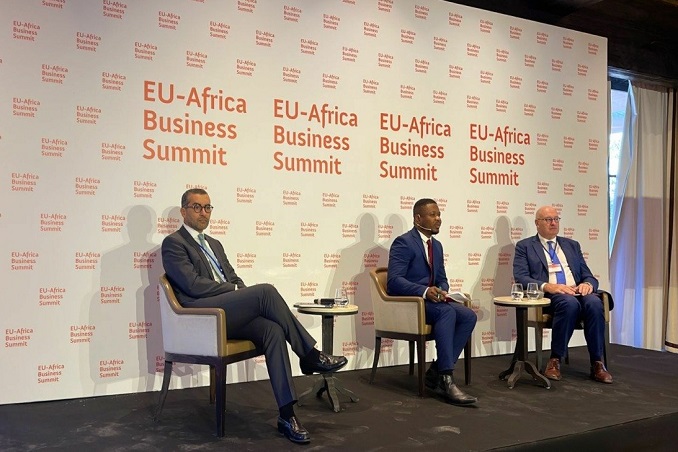![]() Africa – The use of Africa’s fertile land to drive sustainable agriculture and improve food supply has been recommended by investors. This was one of the findings reached by business executives and policymakers during the 4th EU-Africa Commercial Summit, held in Marrakech to boost business and policy activities between the two continents. Experts believe that key private sector investment and policy implementation are required to propel the economy forward.
Africa – The use of Africa’s fertile land to drive sustainable agriculture and improve food supply has been recommended by investors. This was one of the findings reached by business executives and policymakers during the 4th EU-Africa Commercial Summit, held in Marrakech to boost business and policy activities between the two continents. Experts believe that key private sector investment and policy implementation are required to propel the economy forward.
“Now is the time for investors from all around the world to come to Africa and invest.” They have the freedom to set up shop in any location they want under the African Continental Free Trade Area (AfCFTA), and wherever they do, we’re saying that their market is the entire continent,” said Chiza Charles Chiumya, acting Director of the African Union Commission’s Directorate of Industry, Mining, and Entrepreneurship.
“For example, we have the CADEP framework, which promotes agriculture in Africa. We have the Malabo Declaration, which aims to accelerate progress toward agricultural transformation, thus our member nations must fully execute these projects. Dr. Patrick Ndzana Olomo, the head of the AU Department of Economic Affairs’ Investment and Mobilisation of Resources, said, “We call on our member states to ensure that they are able to implement the policies that are in place.”
Related Posts
Agriculture accounts for 23% of Sub-Saharan Africa’s GDP, according to the World Bank. It was also agreed during the EU-Africa business conference that the EU-Africa trade collaboration in the industry should henceforth focus on small-holder farmers. Former EU Agriculture Commissioner Phil Hogan held this role. “We in the European Union stand ready to work with our African Union colleagues and other countries to produce the necessary cash, technical knowledge, and partnerships and alliances to make this happen.” However, the farmer must be at the heart of the action, according to Hogan.
“All of the numerous policy proposals that have been made public.” Here at the European Africa Business Summit, it’s all academic if we don’t have people on the ground who are ready to implement it, and they need to be incentivized and paid properly for the work that they do for carbon farming, renewable energy, and job creation, and this is where we need to refocus our efforts, and in the context of food and nutrition and food security, the farmer must be at the center of the activity,” said the former EU co-ordinator.
The European Union is one of Africa’s most important trading and investment partners. In 2020, its Foreign Direct Investment (FDI) stock in Africa was €222 billion, compared to €42 billion in the United States and €38 billion in China. The summit’s organizers, the EBS group, claim their goal is to create both continents’ common destiny by bringing key corporate leaders, legislators, and specialists together. They went on to say that the EU-Africa collaboration must produce a meaningful partnership with policy objectives, standards, and rules that benefit both continents, especially following the Covid pandemic’s interruption.

